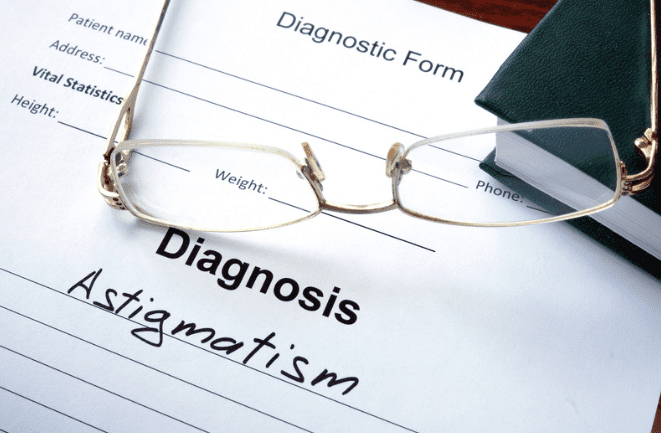Astigmatism is a common vision condition characterized by an irregular curvature of the eye’s cornea or lens. This irregular shape prevents light from focusing properly on the retina, leading to blurred or distorted vision at any distance. Unlike simple refractive errors like myopia (nearsightedness) or hyperopia (farsightedness), astigmatism involves a more complex distortion of vision.
What Causes Astigmatism?
This is often present from birth and can change with age. The exact cause is unknown, but it is generally related to genetics, meaning it can be inherited from one’s parents. Other factors, such as the development of the cornea or lens, can also influence the occurrence of astigmatism.
Symptoms
Individuals with astigmatism may experience a range of symptoms, including:
- Blurred or distorted vision
- Difficulty seeing at night
- Eyestrain or discomfort
- Headaches
- Squinting
Diagnosis and Treatment
This is diagnosed through a comprehensive eye examination. Testing typically includes checking the vision clarity at different distances and measuring how the eyes focus light. Treatment options vary depending on the severity of the astigmatism and may include eyeglasses, contact lenses, or refractive surgery such as LASIK.
Types of Astigmatism
There are several types of astigmatism, each affecting vision in unique ways. These include:
- Myopic astigmatism: One or both principal meridians of the eye are nearsighted.
- Hyperopic astigmatism: One or both principal meridians are farsighted.
- Mixed astigmatism: One principal meridian is nearsighted, and the other is farsighted.
It can also be classified based on the irregularity of the cornea or lens:
- Corneal astigmatism: Due to the shape of the cornea.
- Lenticular astigmatism: Due to the shape of the lens.
Here is a detailed table that covers various aspects of astigmatism:
| Aspect | Description |
|---|---|
| Types | Myopic, Hyperopic, Mixed |
| Causes | Genetic factors, irregular development of the cornea or lens |
| Symptoms | Blurred vision, difficulty seeing at night, eyestrain |
| Diagnosis | Eye exams involving tests for visual acuity and light focusing |
| Treatment Options | Eyeglasses, contact lenses, refractive surgery |
| Refractive Surgeries | LASIK, PRK, Orthokeratology |
| Non-Surgical Options | Prescription eyeglasses, toric contact lenses |
Why Choose Liberty Laser Eye Center?
At Liberty Laser Eye Center, we provide state-of-the-art care for patients suffering from astigmatism. Our commitment to using the latest technologies and techniques ensures that you receive the most accurate diagnosis and effective treatment options available. Our skilled team is dedicated to providing personalized care that meets your unique vision needs.
FAQs
What are the latest advancements in treatment for astigmatism?
Recent advancements in the treatment of astigmatism focus on refining refractive surgery techniques, including the use of wavefront analysis for precise LASIK vision correction. This technology allows surgeons to create a highly detailed map of the eye, significantly improving the outcome of procedures like LASIK. Additionally, developments in lens technology have led to better-designed toric contact lenses that offer greater comfort and clarity.
How does LASIK surgery correct astigmatism?
LASIK surgery corrects astigmatism by reshaping the cornea to create a more regular optical surface. The procedure involves using a laser to make precise adjustments to the curvature of the cornea. For a detailed explanation of the LASIK procedure, visit our LASIK eye surgery procedure explained page.
What is the ideal age to get LASIK for astigmatism?
The best age to get LASIK varies, but it is generally recommended for individuals who are at least 18 years old and have had a stable prescription for at least two years. To learn more about the best age for LASIK, check out our guide on the best age to get LASIK.
Can astigmatism return after LASIK surgery?
While LASIK is very effective at correcting astigmatism, changes in the eye can occur over time that may lead to the return of astigmatism. However, such changes are relatively rare and can often be corrected with additional eye care treatments.
Conclusion
Astigmatism is a treatable eye condition with a range of options available for management and correction. At Liberty Laser Eye Center, we pride ourselves on delivering expert care with the newest technologies in eye surgery and treatment. Whether you need glasses, contact lenses, or are considering LASIK surgery, our team is here to guide you through every step of the process. To explore more about our services and how we can help you achieve clear vision, visit our website. If you are looking for effective treatment options, contact us today to schedule an appointment and learn more about how we can improve your vision.

